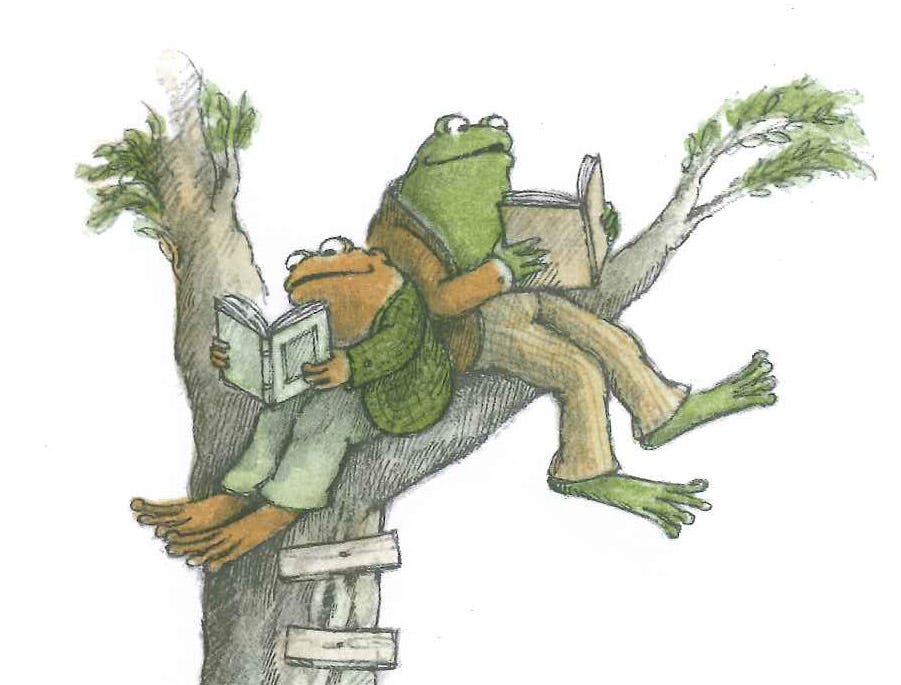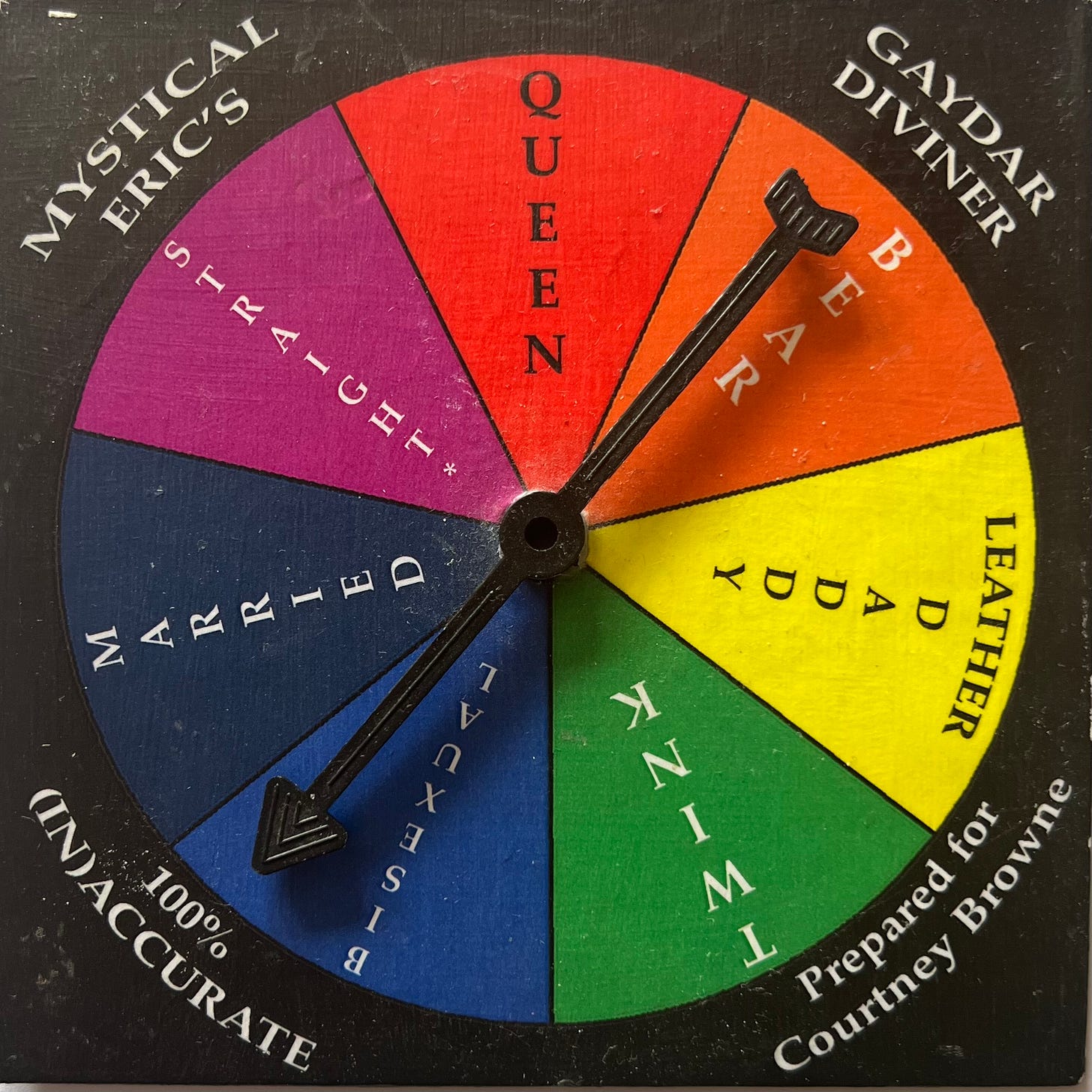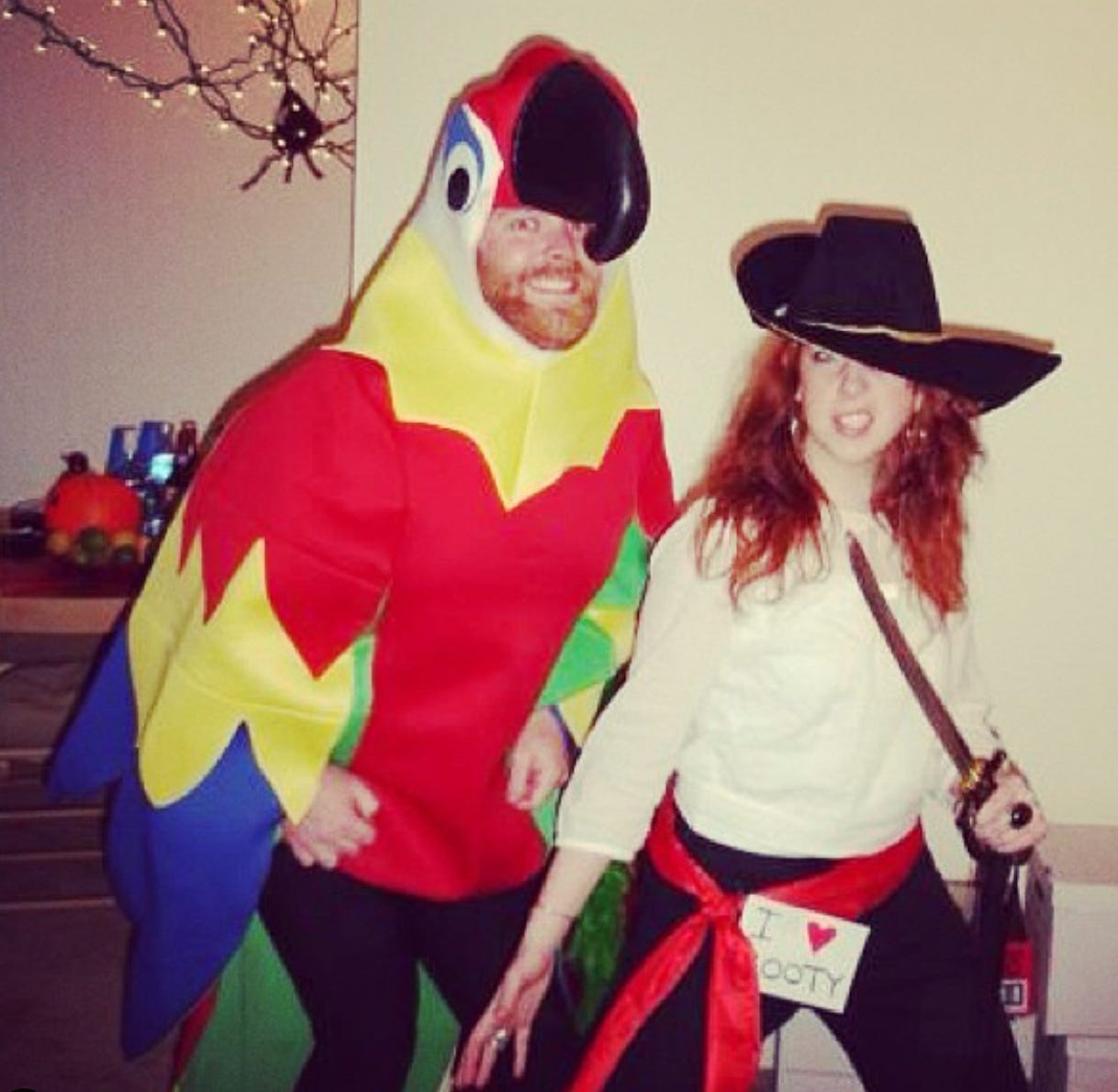Brandon is so cute and so flirtatious. I’m 22 and he waits tables at my favorite restaurant near my apartment and over weeks and weeks I take nearly every friend I have out to dinner so they can see him and see how cute he is and how friendly he is.
He’s from Texas. I know that because I know pretty much everything about him.
On a day I am feeling especially bold I go to his restaurant to eat lunch alone, determined to ask him out on a date by the time I pay the check. It’s taken me a long time to get to this place, to this level of bravery, but here I am. Look out, world!
The bill comes.
I pay the check.
I leave.
“Wait,” my brother says moments later on the phone. I’ve called him in a panic on my walk back to my car. “He’s cute. He’s nice. He’s friendly. What’s the worst that could happen?”
With my brother’s assurances as the wind at my back, I hang up, turn around and return to the now-empty restaurant.
“You’re back!” Brandon calls out from the back of the restaurant. He nears with hands holding stacks of dirty dishes.
“Would you like to go out sometime?” I blurt. (If I say it without thinking, I will actually say it.)
“Oh,” he freezes, his face showing alarm.
The pause, kind reader, is pregnant.
“Courtney…”
“That’s a no.”
“No!” He insists, putting down the plates. “It’s just…”
I brace myself.
He’s not interested.
He’s got a girlfriend.
He’s not dating right now.
“I’m gay.”
He’s gay.
—Wait, WHAT?
“I would love to still hang out,” Brandon says warmly. He is close to me now, holding my arm in a way that a pal might hold a pal’s arm. “As friends.”
The restaurant fills with the sound of a thousand bees. A tumbleweed blows past me. My body floats two feet off the ground and my soul leaves my body through my open mouth.
“This is actually way better,” I, an idiot, declare.
“…What?”
“I mean,” I laugh nervously, “sounds great!”
Brandon pulls at the roll of receipt paper by the cash register, tears off a strip, and writes down his name and phone number.
I take it.
We hug.
I leave and never come back.
If you were expecting this to be the origin story of my close friendship with Brandon as I segue into a cairn for friendship, I am sorry to say it is not. This story isn’t about Brandon.
This story is about Eric.
Eric and I became friends in the creative writing program at university. He is wry and smart and funny. He likes dogs way more than people and is stoic and introverted and his laugh is a guffaw. On the rare occasion when Eric walks into a room filled with people, he will charm them, make them laugh uproariously, and then slip out into the night without being seen.
“Wait,” they will always say, “who was that guy?”
Eric, I should also mention, is gay. I know that and I’ve always known that. (Humblebrag).
This story is about Eric because the first thing I do after I rush out of the restaurant with Brandon’s phone number—that is, after sitting in my car and crying with abject embarrassment—is go home and email Eric everything.
This is significant only because Eric and I haven’t talked since college ended. It wasn’t anything intentional or dramatic. It just was. Our friendship was facilitated by us often being in the same classroom together, and so, when we were no longer in the same classroom together, we were no longer in touch. But one thing I knew then about Eric was not only his ability to find the humor in everything, no matter how tragic or traumatic, but his absolute delight for a good story. And this is a good story.
“Eric,” my email opens. “I know we haven’t spoken in a while, but I have to tell you about the most embarrassing thing that has ever happened to me in my short life. You’re going to love it.”
“I think your gaydar has been stolen,” Eric writes back.
“Maybe I should assemble a rag-tag team of superheroes to help me get it back.”
“Superqueeroes,” he insists. “One’s super power is he can snap his fingers and instantly redecorate a room.”
This is a story about Eric because the bravery that led me to ask out one man (and survive rejection) is the same bravery that led me to reach out to another man who possibly never expected to hear from me again. And now, some 20+ years later, Eric is still my best friend.
A friend recently asked me “do adults have best friends?”, as if besties are solely reserved for teenage girls; and I, surprised by the question, answered incredulously yes. Eric has joined my family’s table at major holidays, advised me through big life changes, seen me get married, and shepherded me through painful and confusing friendship break ups. At the start of the pandemic, for well over a year, Eric was the only person outside of my immediate family that was in my “pod”. Our walks through Golden Gate Park every Thursday were philosophical and introspective and expansive—a liferaft in an otherwise tumultuous and terrible time. We have each lived 1,000 lifetimes in the 20+ years of knowing each other, and our friendship has adapted and grown with each iteration of ourselves.
It is because of my friendship with Eric, as well as many other incredible friendships in various forms throughout my life, that I feel far more drawn to books about the love and intimacy that exists between friends than I do traditional romance novels about the search for a lover. There is an intimacy between friends that is unique enough to warrant its own attention, but seems to get completely under-represented as a genre of fiction.
I want libraries dedicated to this kind of love.
This is not to say that I don’t appreciate or value romantic love. One year my husband got me a Squatty Potty for my birthday. ROMANCE! But truthfully, until I met my husband, I wasn’t particularly focused on—even interested in—pursuing a more traditional life trajectory of marriage and children. Yet I have always—particularly after attending a small, tight-knit all-girls high school—sought to cultivate a community of deep, whole-hearted friendships. (This is not to say I was always good at it, but that’s a cairn for another time).
In compiling a cairn for friendship, I struggled to find books that scratched the itch of what I was looking for. Books about female friendships, it seems, often center relationships that start in childhood—as if there is a deadline to making close friendships—even though science has shown how important female friendships are at reducing stress and stress hormones in women. Books about friendship break ups often take place in high school and/or in Young Adult novels, even though studies show us that we lose about half our close network of friendships every seven years. The intimacy of platonic relationships, particularly between people of the opposite sex, seem rarer still. There appear to be far more friends-to-lovers plot lines than friends-to…friends (even friends-to-notfriends-back-to-friends). The gap in fiction, particularly literary fiction, it would seem, does not reflect the reality of the role that friendship plays in people’s lives. Or at least the way it does in mine.
Off the page, there does seem to be a cultural shift in acknowledging the priority of platonic love in our lives. Podcasts like Danielle Bayard Jackson’s Friend Forward cover a wide range of topics related to friendship—acknowledging that there is more cultural support, value and attention given to pursuing romantic relationships and supporting friends through romantic break ups than their platonic counterparts. People are beginning to redefine what relationships, marriage and family look like, particularly where it comes to caretaking and raising children, building a framework outside of well-worn categories. Oprah recently spoke to Melinda Gates about how central her decades-long friendship with Gayle King has been to the quality of her life.
On the page, it feels like the majority of books giving friendship the attention it deserves can be found largely in the non-fiction section.

Has fiction not caught up? Am I looking in the wrong place?
I want more books about grown adult humans pursuing platonic but close friendships with each other—the butterflies, the second guessing, the courtship—not just books about women pursuing romantic love from a man. I desperately want more books that explore friendship break ups in adulthood: how we accept that romantic relationships may come and go, but believe friendships will last forever. Please, fiction everywhere: let me see myself in the pages of books unafraid to dive into the abject grief that comes when we learn the hard truth that this is not always the case. I want books about healing and finding new friendships after the heartache of losing a big friendship, just as we might find books where the main character learns to love again after a traumatic divorce.
Alok V. Menon, on an episode of Prentis Temphill’s podcast Finding Our Way, spoke of friendship in a way that was so beautiful and affirming, I listened to it and then immediately listened to it again. Alok says:
Give me a book about this kind of love. And then give me 1,000 more.
So here’s to books about life-long creative collaborators. Here’s to books about platonic love between a straight man and woman that never ventures into the gray area of predictable romantic expectation. Here’s to friendships persisting through cancer, navigating conflict, surviving loss. Here’s to books about the love and intimacy of friends.
And if you haven’t already, find yourself an Eric. Even if it means asking out a gay man from Texas.
I promise: it will be worth it.
Courtney x
Tomorrow and Tomorrow and Tomorrow by Gabrielle Zevin.
With a friendship break up, friendship reconciliation, and platonic love between a man and a woman, it’s no wonder this is an all-time favorite for me.
Truth and Beauty by Ann Patchett.
A beautiful, moving and heartbreaking memoir about the friendship between author Ann Patchett and poet Lucy Grealy, who met in college in 1981. Grealy, who lost part of her jaw in childhood due to cancer, struggles to find love, most especially for herself, through years of chemotherapy, radiation and reconstructive surgeries. Patchett loves her enough for the both of them.
The Rachel Incident by Caroline O’Donoghue.
Amidst the backdrop of economic strife in Ireland, this is the story of Rachel and her best friend James and what happens when they both fall in love with the same married man.
We All Want Impossible Things by Catherine Newman.
Edi and Ash have been best friends for over forty years. Edi has been diagnosed with cancer and moved to hospice care. Ash is desperately clinging to life’s beauty while doing the impossible work of letting go of her best friend.
Lonely Castle in the Mirror by Mizuki Tsujimura.
Seven outcasts struggling to fit in at school discover that the mirrors in their bedrooms are magical portals to a magnificent castle. Each day, while their parents think they are at school, they step through the portal and spend their days with each other. Over time they begin to unlock the castle's secrets and then, eventually, each other's.









